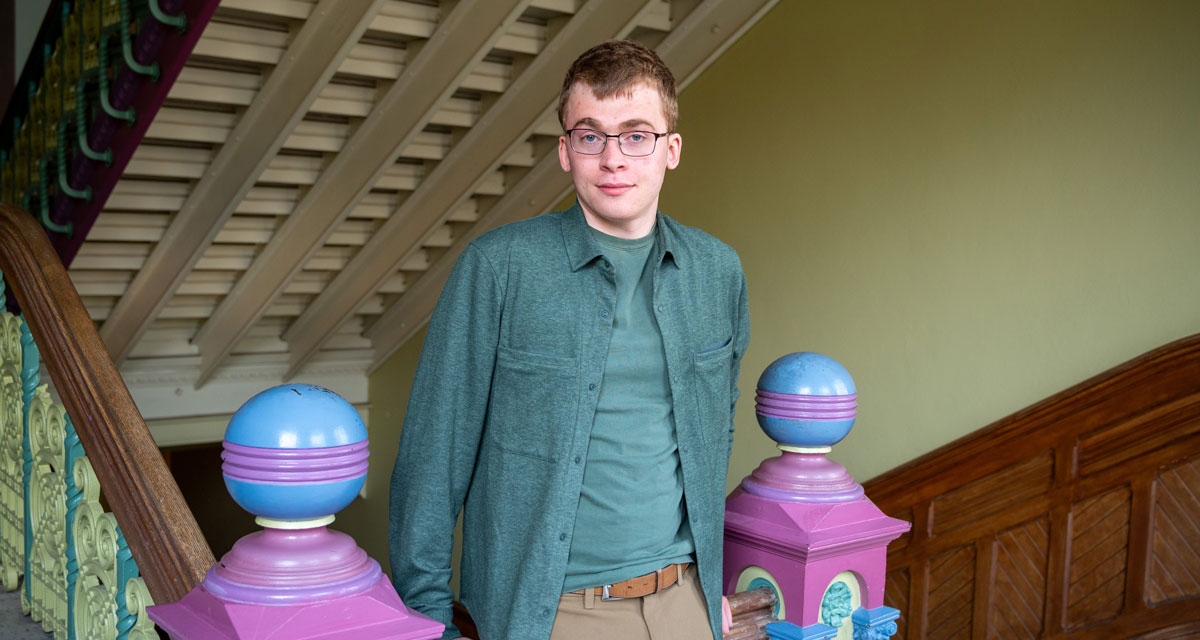Thriving Together: Supporting Neurodiverse Students at Vic

(Photo by Minh Truong)
Lucas Marsh had high expectations for Orientation Week when he arrived at Victoria College. Maybe too high. Some of the activities that came easily to others–finding social groups, meeting faculty, diving into university life–were difficult for him.
“What I valued most about Vic was that I felt like I belonged here and I’m accepted as my real self,” Marsh says. But Orientation Week “was too quick and I needed to get my bearings for the first few weeks.”
In most respects, Marsh is like any other student at Vic. When he’s not hitting the books, Marsh is busy hanging out with friends or playing Dungeons & Dragons on the weekends. He cares about his community, and volunteers at the Daily Bread Food Bank. He says that when he has completed his studies, he hopes to secure a job at the UN or an NGO. He’s even considering a career in journalism.
The only thing that makes Marsh different from some of his peers is that he identifies as having Asperger’s syndrome, which he says is part of autism spectrum disorder. It’s a condition that can affect sensory processing, social communication, task execution and emotional regulation. It can make social situations like Orientation overwhelming.
“People in the autism community often find new environments and social interactions overwhelming,” says Marsh. “Your first time at university is both of those things at once. While you’re trying to adapt to a whole new place, you also have to deal with trying to make friends. On top of all that, you also have Asperger’s. So, you know that you can mess something up socially.”
The challenges faced during Orientation were just one of the topics discussed at Vic U’s 11th annual “Minding Our Minds” conference last fall. Marsh, a planner and panellist, openly shared his experiences as a neurodivergent student.
The conference was one of several Victoria University initiatives aimed at fostering a deeper understanding of students’ specific needs. One takeaway was the importance of allocating dedicated time for neurodiverse students. As a result, Vic hosted a “Neurodiversity Day of Learning” in May.
“Orientation was an amazing opportunity to meet people and make friends,” Marsh says. “But I wished there were targeted neurodivergent events. We tend to connect better with each other socially than we do with neurotypical people.”
Kelley Castle, dean of students at Victoria College, has spent more than a decade championing student wellness at Vic and emphasizes how important it is for large, urban schools like U of T to provide extra support.
“U of T is consistently grappling with the issue of students feeling isolated,” she says. This observation is reflected in U of T’s below-average scores on national surveys regarding campus engagement and student support.
“It’s very difficult for anybody to find their community at U of T, and for some people, reading social cues and figuring out how to navigate social situations can be a real challenge in and of itself,” she says.
Considering that students with ASD and ADHD make up nearly a quarter of the over 6,000 individuals registered with U of T’s Accessibility Services office, taking action is crucial now more than ever.
“Vic U signed the Okanagan Charter this year, recognizing that wellness needs to be embedded into all aspects of campus culture,” Castle says. “That entails recognizing that a healthy campus might mean different things for different students.”
Castle adds that one of the key pillars in Vic’s strategic framework is to cultivate a sense of belonging, where students truly feel they are welcome.
“There’s no question in my mind that colleges like Vic serve a particular function of making students feel like they have a home and that they can be recognized and seen for who they are. And as we become smaller and more tailored in the services we provide, more individuals will feel a sense of belonging here.”
Marsh says that events like Minding Our Minds play a crucial role in nurturing the supportive environment needed for neurodiverse individuals to thrive. It’s something he thinks Vic is especially well suited for, given its tightly knit community and small class size, like those found in the Vic One program.
“The profs in the Vic One Pearson stream were truly amazing, and the small class environments were really good for neurodiverse students because it can take away a lot of the social pressure of meeting your classmates,” he says.
The Vic One classes, with fewer than 25 students per instructor, prioritize group discussion. Marsh says this type of learning environment provides an additional advantage for students with ADHD.
“It’s easier to hold your attention when it’s more of a group conversation,” he says. “When there are hundreds of kids in a lecture hall there’s nothing keeping you in there. In Vic One there was never a class where someone in the room didn’t contribute to the discussion.”
It’s learning opportunities like this, along with an overall “ethos of inclusivity and acceptance” that Marsh says make Vic one of the best colleges for the neurodiverse.
This article originally appeared in the Summer 2024 issue of Vic Report.
